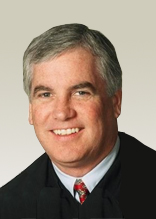By Janet Elliott
Staff Writer for The Texas Lawbook
AUSTIN – At a time when pharmaceutical companies are aggressively marketing their products directly to consumers, the Texas Supreme Court ruled that a drug manufacturer fulfills its duty to warn consumers by providing an adequate warning to the prescribing physician.
The court threw out $4.8 million awarded to Patricia and Thomas Hamilton of Corpus Christi after a jury found that a subsidiary of Johnson & Johnson had fraudulently marketed Remicade, a drug used to treat Crohn’s disease. Patricia Hamilton developed extreme pain and reduced range of motion in her joints, leaving her unable to dress herself, perform household chores or drive.
She was diagnosed with drug-induced lupus, a known side-effect of the Remicade treatments. Hamilton claimed that the physician-patient relationship was bypassed when she was shown the company’s informational video that emphasized the drug’s benefits and showcased patient success stories, but did not list lupus as a potential side effect.
In a unanimous ruling, the court held that a prescription drug manufacturer fulfills its duty to warn consumers by providing an adequate warning to the prescribing physician. It found that the 13th Court of Appeals in Corpus Christi erred by creating an exception to the “learned intermediary” doctrine for direct-to-consumer advertising.
“Because patients can obtain prescription drugs only through their prescribing physician or another authorized intermediary and because the ‘learned intermediary’ is best suited to weigh the patient’s individual needs in conjunction with the risks and benefits of the prescription drug, we are in agreement with the overwhelming majority of other courts that have considered the learned intermediary doctrine,” said Justice Paul Green in the opinion.

While leaving room for a future situation that might require exceptions to the doctrine, the court said the harm claimed by Hamilton was not caused by the manufacturer’s direct advertising. Thomas Hamilton first learned about the drug from a news report and Patricia Hamilton had already visiting with her physician and decided to take the drug before she saw the informational video.
“We are pleased with the Texas Supreme Court decision on behalf of Centocor,” said Monica Neufang, a spokesman for the J&J subsidiary, which has changed its name to Janssen Biotech, Inc.
John Gsanger, who represented the Hamiltons, said the drug company gave false information about the drug to Hamilton’s prescribing doctor.
“Centocor represented to the Physicians’ Desk Reference that there were only three cases of lupus-like symptoms associated with Remicaid,” he said. “There was a contemporaneous email showing that Centocor was actually following 175 cases of lupus associated with Remicaid, and Centocor had already confirmed that dozens of those cases were definitely or probably Remicaid-induced lupus.”
Gsanger, a partner in the Edwards Law Firm of Corpus Christi, said the Supreme Court adopted a new standard for learned intermediary defense and should have sent the case back for a new trial.
The pharmaceutical industry and free market groups had weighed in on behalf of Johnson & Johnson. Texas doctors, however, argued that the learned intermediary doctrine was outdated in this time of mass marketing of pharmaceuticals.
“The doctrine emerged in an era in which citizens were largely unsophisticated, physicians were a paternal and exclusive source of health care information, and the drug delivery system in this country depended solely on the health care provider to provide warnings and instructions to the patient. Such circumstances do not exist in the healthcare system of the twenty-first century,” said the amicus brief filed on behalf of the Texas Medical Association by Brent Cooper.
“The mere presence of an intermediary should not excuse the manufacturer from warning those whom it should reasonably expect to be endangered by the use of its product,” the brief stated.
The prescribing physician for Patricia Hamilton settled for an undisclosed amount.
Cooper, a shareholder in Dallas’ Cooper & Scully, said Friday that he is happy the court recognized there could be an exception based on a manufacturer’s consumer advertising although it did not apply the exception in the Hamiltons’ case.
“The challenge for consumers in the future, they are going to have to show that the advertising influenced or was a factor in their decision to use a particular drug or medical device,” Cooper said.
PLEASE NOTE: Content of The Texas Lawbook is controlled and protected by specific licensing agreements with our subscribers and under federal copyright laws. Any distribution of this content without the consent of The Texas Lawbook is prohibited.
